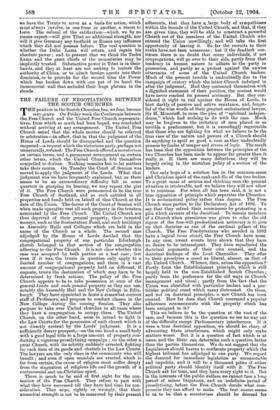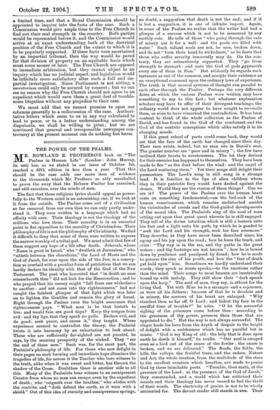T HE position in the Scotch Churches has, we fear, become
very grave. On Friday week the Conference between the Free Church and the United Free Church representa- tives, from which so much had been hoped, was concluded without arriving at any arrangement. The United Free Church asked that the whole matter should be referred to arbitration—in effect, that is, that the judgment of the House of Lords should be disregarded and the question reopened—a request which the victorious party, perhaps not unnaturally, refused. The Free Church offered a moratorium on certain terms, and a permanent arrangement on certain other terms, which the United Church felt themselves compelled to decline. Nothing remains but to let matters take their course. On Tuesday the Court of Session was moved to apply the judgment of the Lords. What that judgment was we have frequently explained, but as there seems to be an extraordinary difficulty felt in some quarters in grasping its bearing, we may repeat the gist of it. The Free Church were pronounced to be the true Free Church of Scotland, and as such entitled to all properties and funds held on behalf of that Church at the date of the Union. The decree of the Court of Session will when made operative vest all such property in the trustees nominated by the Free Church. The United Church are thus deprived of their general property, their invested moneys, such as the Sustentation Fund, and such buildings as Assembly Halls and Colleges which are held in the name of the Church as a whole. The second case adjudged by the House of Lords decided that the congregational property of one particular Edinburgh church belonged to that section of the congregation adhering to the Free Church. It is not clear whether this case was accepted by both parties as a test case ; but even if it was, the trusts in question only apply to a limited number of congregations, and there is a vast amount of congregational property held on different, if cognate, trusts the destination of which may have to be determined by fresh actions. The policy of the Free Church appears to be to take possession at once of the general funds and such general property as they can use, notably the Assembly Hall and the New College in Edin- burgh. They have appointed in haste a somewhat curious staff of Professors, and propose to conduct classes in the New College during the coming Session. They also purpose to take over United churches in all cases where they have a congregation to occupy them. The United Church, on the other hand, seem to intend to fight in the Law Courts for the possession of each church which is not directly covered by the Lords' judgment. It is a sufficiently dreary prospect,—on the one hand a small body with a good legal title to a large amount of property con- ducting a vigorous proselytising campaign ; on the other a great Church, with its activity suddenly arrested, fighting for each item of its goods and chattels in the Law Courts. The lawyers are the only class in the community who will benefit ; and even if open scandals are averted, which is far from certain, the cause of religion must suffer deeply from the stagnation of religious life and the growth of a controversial and un-Christian-spirit.
There is much to be said at first sight for the con- tention of the Free Church. They refuse to part with what they have recovered till they have had time for con- sideration. They urge, rightly or wrongly, that their numerical strength is not to be measured by their present adherents, that they have a large body of sympathisers within the bounds of the United Church, and that, if they are given time, they will be able to construct a powerful Church out of the members of the United Church who entered the Union unwillingly, and will take the first opportunity of leaving it. So far the recruits to their ranks have not been numerous ; but if the deadlock con- tinues there is no doubt that many individuals, if not congregations, will go over to their side, partly from that tendency in human nature to adhere to the party in possession, and partly as a protest against the unwise utterances of some of the United Church leaders. Much of the present trouble is undoubtedly due to the campaign of oratory which the latter Church indulged in after the judgment, Had they contented themselves with a dignified statement of their position, the contest would have never reached its present acrimony. But they con- sidered it right to rail against the House of Lords, to hint darkly of passive and active resistance, and, forget- ful of the wise words of their greatest ecclesiastical lawyer, Sir H. Moncrieff, to raise the plea of " spiritual indepen- dence," which had nothing to do with the case. Much may be forgiven to the irritation of men placed in so terrible a predicament, but it is exceedingly regrettable that those who are fighting for what we believe to be the true view of the nature and powers of a Church should do anything to spoil so good a case as they undoubtedly possess by faults of temper and errors of logic. The result has been that the opposition between the principles of the two Churches has been made to appear far greater than it really is. If there are many defections, they will be largely owing to the mistaken policy of a section of the leaders.
Our only hope of a solution lies in the common-sense and Christian spirit of the rank-and-file of the two bodies. To a great mass of serious and thinking men the present situation is intolerable, and we believe they will not allow it to continue. For when all has been said, it is not a true opposition of principle which separates the Churches. It is ecclesiastical policy rather than dogma. The Free Church were parties to the Declaratory Act of 1892. To say that they salved their consciences by protesting is a plea which savours of the Jesuitical. To remain members of a Church when permission was given to relax the old rigour of the free-will-predestination antinomy is to give up that doctrine as one of the cardinal pillars of the Church. The Free Presbyterians who seceded in 1892 have a logical locus standi, the Free Church have none. In any case, recent events have shown that they have no desire to be intransigent. They have repudiated the doctrinal arguments of their own counsel, and the doctrinal findings of the Lord Chancellor. They offer to their proselytes a creed as liberal, almost, as that of the United Church. Whence, then, arises the opposition ? Partly from the Establishment principle, which is still largely held in the non-Established Scotch Churches ; partly from the preference for the old ways in Church management and ritual ; partly from the fact that the Union was identified with particular leaders and a par- ticular political creed which many distrusted. On these, and not on doctrinal principles, a new Church has been created. How far does that Church command a popular adherence commensurate with the property which has been assigned to it ?
This we believe to be the question at the root of the case, and because this is the question we see no way out of the difficulty except Parliamentary interference. If it were a true doctrinal opposition, we should be chary of advocating State interference, which might only make matters worse. But it is a question of fact which is at issue, and the State can determine such a question better than the parties themselves. We do not suggest that the Legislature should hasten to confiscate property which the highest tribunal has adjudged to one party. We regard the demand for immediate legislation as unreasonable and impolitic, and it will be a thousand pities if either litical party should identify itself with it. The Free Church ask for time, and they have every right to it. But in the interests of the public welfare we cannot face a long period of minor litigations, and an indefinite period of proselytising, before the Free Church decide what com- promise they can afford to make. The best course seems to us to be that a moratorium should be decreed for a limited time, and that a Royal Commission should be appointed to inquire into the facts of the case. Such a Commission would give ample time to the Free Church to find out their real strength in the country. Both parties would be represented before it, and the Commission would arrive at an exact understanding both of the doctrinal position of the Free Church and the extent to which it is to be popularly supported. If these facts were ascertained by an impartial tribunal, then the way would be paved for that division of property on an equitable basis which must come sooner or later. The Free Church are opposed to immediate arbitration, but they cannot object to an inquiry which has no judicial aspect, and legislation would be infinitely more satisfactory after such a full and im- partial investigation. Since Parliament is not sitting, a moratorium could only be secured by consent ; but we can see no reason why the Free Church should not agree to an expedient which would. save them a great deal of trouble- some litigation without any prejudice to their case.
We must add that we cannot promise to open our columns generally to a rediscussion of the case. Authori- tative letters which seem to us in any way calculated to lead to peace, or to a better understanding among the disputants, we shall be willing to print; but we are convinced that general and irresponsible newspaper con- troversy at the present moment can do nothing but harm.











































 Previous page
Previous page